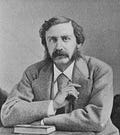Humboldt Bay, California
Bret Harte
Twenty-three-year old Francis Bret Harte huddled in the dark of his cabin, grasping his one pistol. Outside the mob seethed and chanted. Chanted for him.
He’d gotten a glimpse of them through a knot in the door. Hooded men with torches, gathered outside the cabin. The militia leader holding a noose. The crowd jeering, taunting Harte: “Come out and meet Judge Hemp!”
Frank Harte had no doubt they meant to murder him. After all, three nights ago they’d killed at least a hundred innocent people.
At least he hadn’t stood by. He could go to his grave knowing that he’d done what was in his power to do.
It had been dawn when the canoes began drifting down, dark barges on the misty river. Floating down from the island with their terrible cargo.
Harte had been on his way to the one-room office of the Northern Californian where he worked as assistant editor, and so was one of the first to glimpse the canoes. He stopped still on the bank, looking out in mounting horror as the boats floated by. The boats were piled with bodies, the flesh hideously mutilated. Mostly women, children, and elderly. Clubbed to death, some with their throats slashed.
Dozens and dozens of dead. Harte stopped counting after a hundred. It was impossible to take in.
And then in one canoe, he saw one of the bodies move. And another.
From the injured survivors, Harte pieced together the story. The local Wiyot tribe had invited tribes from the nearby Mad and Eel Rivers to a religious festival on Indian Island in Humboldt Bay. All through the month the Humboldt Volunteers, an unofficial militia recently formed by citizens of the Eel River Valley, had been clashing with local bands of Indians. The Volunteers claimed a tribe allied with the Wiyots had killed cattle belonging to white ranchers, though Harte knew that such claims were often fabricated by vigilantes intent on killing Indians. It was happening all over the state.
In the dead of night, a band of white men showed up armed with axes, clubs, and knives, and massacred the peaceful Wiyots, mostly women and children.
Frank went out to the village and found more carnage. More dead, more survivors, some barely recognizable through the mutilation.
Rage welled up inside him.
He knew he was no one’s image of a fighter. Soft-spoken and shy, he’d been bullied in school for his pink complexion.
But writing was a different matter. In writing he spoke his outrage.
All that day and night he poured it onto the page like a man possessed, describing in detail the horrors he had seen, and blistering the militia for the massacre.
Harte’s editor was temporarily out of town, leaving Harte in full charge of the paper. He published the account himself the next day.
Indiscriminate Massacre of Indians—Women and Children Butchered
A more shocking and revolting spectacle never was exhibited to the eyes of a Christian and civilized people. Old women wrinkled and decrepit lay weltering in blood, their brains dashed out and dabbled with their long grey hair. Infants scarcely a span long, with their faces cloven with hatchets and their bodies ghastly with wounds.
This writer was upon the ground with feet treading in human blood, horrified with the awful and sickening sights which met the eye whenever it turned.
Here was a mother fatally wounded hugging the mutilated carcass of her dying infant to her bosom; there a child of two years old, with its ear and scalp torn from the side of its little head. Here a father frantic with grief over the bloody corpses of his four little children and wife…. The wounded, dead and dying were found all around, and in every lodge the skulls and frames of women and children cleft with axes and hatches, and stabbed with knifes, and the brains of an infant oozing from its broken head to the ground.
They were all killed with the exception of some few who hid themselves during the massacre. No resistance was made, it is said, to the butchers who did the work, but as they ran or huddled together for protection like sheep, they were struck down with hatchets. Very little shooting was done, most of the bodies having wounds about the head.
The parties who may be supposed to represent white civilization have committed the greater barbarity. We can conceive of no palliation for woman and child slaughter. We can conceive of no wrong that a babe’s blood can atone for…
At first dark, the mob had come for him.
As the chanting intensified outside, Harte looked down at the pistol in his hand. He doubted he’d be able to fire it at a living being, no matter how loathsome.
He’d been contemplating a move to San Francisco.
If he survived the night, it would seem the time was at hand.




What a history of America... not exactly the way HCR recounts it.